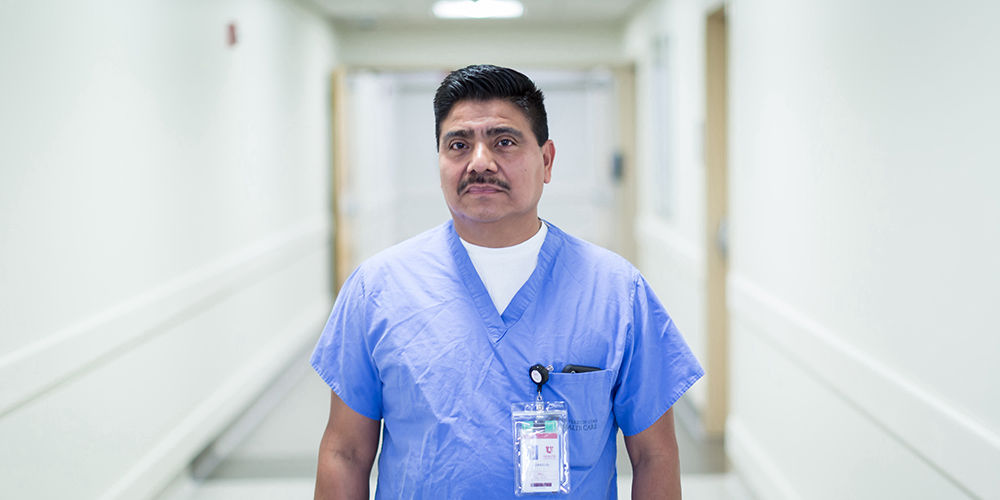have worked in the medical ICU as a nursing assistant for over 12 years. This year has been a very difficult one. The medical ICU has always been a busy unit, but now, more than ever, COVID-19 is affecting all of us—individually and as a family.
Working in a hospital, providing care along with nurses and doctors, has always been a rewarding experience for me. The pandemic makes this year so much more difficult because if someone is admitted to the hospital, their family can't stay with them. They only know how their loved one is doing by getting updates from nursing and/or from their doctors.
As we all know, the novel coronavirus has affected a large number of Hispanic people. I am a Spanish interpreter, and I use this skill in the medical ICU to help nurses, doctors, and social workers update families about the medical conditions of their loved ones. What I say to these families is often not what they want to hear. Sometimes a patient with COVID-19 will ask, "Why me?" And I say, "I don't know."
Sometimes a patient with COVID-19 will ask, "Why me?" And I say, "I don't know."
There have been a lot of sick patients in the unit. I remember one patient in particular who stayed for over a month. With our help, and the CVICU team, we were able to send him home. It was both worrying and emotional to see him go home to stay with his family on the morning he was discharged.
Explaining to a family member how sick a patient is is hard. But I always let them know that we are doing the best we can, and that we are always giving the patient the best care possible.
Meet Cornelio Morales
Cornelio Morales grew up in Oaxaca, Mexico, one of seven children in a family that struggled with poverty. He went to nursing college in Oaxaca because he knew there was always work for nurses. He moved to Los Angeles in 1992 and trained to be a Certified Nursing Assistant. In 2006, shortly after his second child, Catherine, was born, he moved to Utah. He’s worked in nursing for 19 years, 11 of those as a health care assistant (HCA) at the MICU. He’s widely respected for both his knowledge—doctors call him “Dr.” Morales—and the kindness and thoughtfulness he shows patients. He has three children. The middle, Catherine, suffers from a genetic disease that requires care round-the-clock. Catherine taught Morales not only how to see a patient’s needs, but also their family’s too.
Listen to Cornelio tell his story on the U of U Health podcast, Clinical, by Stephen Dark and Mitch Sears.
Cornelio Morales
Lawrence Marsco, Director of Inpatient Nursing at Huntsman Cancer Hospital, shares this candid reflection about his tumultuous journey in health care. Today, he relies on shared governance, transparency and shared decision making to lead others through their journey.
With so few organs available for transplant, living-donor transplantation introduces improved organ quality, reduced wait times, predictable scheduling, and reduced risk of rejection. But it isn't easy—the investment and risks are huge. Robin Kim, University of Utah Transplant Division Chief, shares his commitment and the complexity of his practice.
How can we put compassion for ourselves and others at the center of what we do? Second year medical student Tanner Nelson interviews pediatric ophthalmologist Griffin Jardine to share how he helps to install hope and compassion with his patients, and himself.
